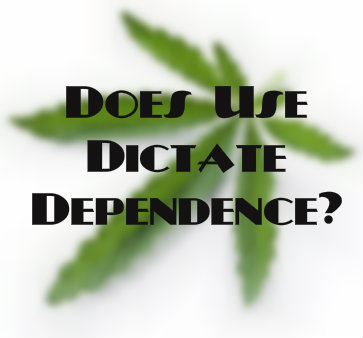Marijuana Habits May Dictate Dependence
If scientists can develop an understanding of how a casual user sometimes becomes an addict while others do not, they may be more equipped to prevent addiction. Understanding how casual marijuana experimentation turns into addiction may help in prevention and intervention strategies, in addition to shaping public policy. A recent study identified behavior patterns that may determine whether a person develops an addiction to marijuana.
 The study, which was led by Peggy van der Pol of the Trimbos Institute of the Netherlands Institute of Mental Health and Addiction, suggests that theories about whether increased levels of the psychoactive ingredient delta-9-tetrahydrocannabinol (THC) can influence addiction may not be relevant. With varying potencies of THC available in marijuana, the researchers wanted to see whether potency, habits of the user or both determined the likelihood of them becoming addicted.
The study, which was led by Peggy van der Pol of the Trimbos Institute of the Netherlands Institute of Mental Health and Addiction, suggests that theories about whether increased levels of the psychoactive ingredient delta-9-tetrahydrocannabinol (THC) can influence addiction may not be relevant. With varying potencies of THC available in marijuana, the researchers wanted to see whether potency, habits of the user or both determined the likelihood of them becoming addicted.
Some scientists have argued that even when THC is more potent users may compensate by inhaling less. However, the authors say there is a much more relevant predictor.
While smokers of more potent pot receive more THC now than users of older generations of marijuana, the style of smoking is a better predictor of which users are likely to become dependent. Van der Pol explains that while every drug carries risk, the more potent forms of marijuana cause the user to take in more THC.
How Is Dependence Developed?
Other studies have focused on frequency of use when examining how dependence developed, as well as THC levels. Van der Pol’s team looked at data from 98 young adults enrolled in a long-term study on regular marijuana use in the Netherlands. The users were recruited from cannabis dispensing coffee shops, as well as through referrals. The participants all reported using marijuana at least three days per week in the previous year. One in three of the participants met criteria for dependence at baseline. The participants were mostly men and were an average age of 23.
Eighteen months after recruitment, and at another follow-up point at three years, the participants were interviewed about their cannabis use, and were even asked to smoke during the interview.
The researchers documented the specific behaviors each participant demonstrated, from rolling their joints to how often they puffed on the joint. To provide a picture of regular behaviors, the participants were asked to bring their own cannabis and roll their own joints.
The smokers who used more potent pot containing higher concentrations of THC did not roll weaker joints. Instead, they used more pot in each joint when compared to users of less-potent marijuana.
The potent pot users did inhale less smoke and had a slower pace of smoking when compared with their peers. However, these adjustments weren’t sufficient to compensate for the higher level of THC in the marijuana.
Instead of THC exposure, the study results showed that only behaviors specific to smoking were predictors of dependence. How many puffs a smoker took, and the amount they smoked, were the only strong predictors of dependence at three years following the initial examination.
The study’s findings may have an immediate impact on how users are educated about marijuana dependence. New users may be exposed to a stronger potency of marijuana and consume high levels of THC.
Find Out If Marijuana Legalization Is Leading To Increased Use



